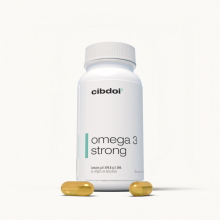Is It Good to Take Omega-3 Everyday?
Published:
Omega-3 fatty acids provide a wide array of health benefits. These essential fats support brain function, vision, heart health, pregnancy, and more.
Contents:
Given the broad benefits of omega-3s, many people choose to take fish oil or algae supplements daily. But is it safe and effective to take omega-3s every day?
Below is a detailed look at the evidence on daily omega-3 supplementation and its effects on health.

An Overview of Omega-3s
Omega-3s are a type of polyunsaturated fatty acid found naturally in certain foods and the body. The three main omega-3s are:
- EPA (eicosapentaenoic acid): Has strong anti-inflammatory effects. Mainly found in seafood.
- DHA (docosahexaenoic acid): Plays a key role in brain function. Also primarily obtained from fish.
- ALA (alpha-linolenic acid): Found in plant oils. The body can convert ALA to EPA and DHA in small amounts.
These omega-3 fats provide many essential functions, including:
- Fighting inflammation
- Supporting cell membrane structure
- Regulating immune function
- Aiding neurological development
- Enhancing brain function
- Promoting heart health
- Maintaining vision
- Improving mental health
However, the typical Western diet tends to be too low in omega-3s. Taking a daily supplement can help increase intake of these beneficial fats.
Below we’ll analyze the evidence on potential benefits and risks of daily omega-3 supplementation.
Potential Benefits of Daily Omega-3s
Here’s an overview of the many ways getting an everyday dose of omega-3s may enhance wellness:
1. Better Heart Health
Omega-3s provide important benefits for cardiovascular function including:
- Lowering triglycerides and blood pressure
- Preventing arrhythmias
- Reducing atherosclerotic plaque
- Decreasing risk of heart attack and stroke
For optimal effects, studies suggest a daily dose of 250-500 mg of EPA/DHA. This may lower heart disease risk by up to 30%.
2. Improved Brain Function
The brain is highly enriched with DHA, making omega-3s essential for cognitive health. Daily intake promotes:
- Sharper memory and focus
- Faster processing speed
- Better learning ability
- Healthy neuron structure
- Lower risk of dementia
Aim for at least 250 mg per day of DHA to keep your brain performing its best.
3. Healthy Vision
DHA is a primary structural component of the retina, making omega-3s crucial for eye health. Regular intake helps:
- Prevent macular degeneration and vision deterioration
- Reduce dry eye syndrome
- Minimize risk of retinal disease
- Improve visual acuity
At least 250-500 mg per day of DHA and EPA optimizes eye health.
4. Enhanced Mood and Mental Health
Omega-3s help regulate neurotransmitters involved in mood, focus and motivation. Daily supplementation can:
- Improve symptoms of depression and anxiety
- Reduce stress
- Boost concentration and productivity
- Stabilize mood swings
- Prevent seasonal affective disorder
For mental health benefits, aim for at least 1,000 mg/day of EPA.
5. Decreased Inflammation
Omega-3s counteract chronic inflammation - a contributor to nearly all major diseases. Taking them daily helps:
- Lower inflammatory markers like C-reactive protein (CRP)
- Reduce joint pain and stiffness
- Minimize inflammatory conditions like arthritis, colitis and asthma
- Speed injury recovery and exercise soreness
Aim for 1,000-2,000 mg per day of EPA/DHA to lower inflammation.
6. Healthy Pregnancy and Child Development
Omega-3s are vital for fetal brain and eye formation. Daily supplementation during pregnancy and breastfeeding:
- Enhances baby’s neurodevelopment
- Reduces risk of preterm birth
- Improves birth weight
- Lowers chances of postpartum depression
- Increases DHA levels in breast milk
At least 300 mg per day of DHA promotes a healthy pregnancy.
Given their broad benefits for overall wellness, there is a strong case for taking an omega-3 supplement daily.
Is it Safe to Take Omega-3s Every Day?
Generally, yes - daily omega-3 supplementation is safe for most people when used appropriately.
Here’s what studies reveal about the safety of daily omega-3 intake:
- No serious side effects up to doses of 5,000 mg per day in healthy adults
- No adverse impacts on glucose metabolism or insulin levels
- Does not negatively affect cholesterol levels - may improve triglycerides and HDL
- Not associated with increased risk of bleeding disorders at dosages under 3,000 mg per day
- Safe for long-term daily use up to 2-5 years based on clinical trials
- Not shown to interact dangerously with most medications
- Well-tolerated during pregnancy - does not increase preterm birth risk
The most common side effects are temporary fishy aftertaste, nausea or stomach pains. To minimize side effects:
- Choose quality omega-3 products verified for purity
- Start with lower doses and work up slowly
- Take with food or divide dose throughout the day
- Avoid questionable sources like rancid fish oil
Under medical guidance, daily omega-3 intake is generally very safe long term. But certain groups should exercise more caution:
- Blood thinners - can increase bleeding at very high doses
- Surgery patients - stop supplements 2 weeks before surgery
- High triglycerides - start low and have levels monitored
- Seafood allergy - choose an algae-based supplement
Talk to your doctor before taking omega-3s daily if you have any concerns or underlying medical conditions.
What is the Optimal Daily Omega-3 Dosage?
The ideal omega-3 dose depends largely on your specific health goals. Here are general daily recommendations:
General health: 500-1,000 mg EPA/DHA total
Heart health: 1,000 mg EPA/DHA total
Brain health: 250-500 mg DHA
Mood support: 1,000-2,000 mg EPA
Eye health: 250-500 mg DHA and EPA
Pregnancy: 300 mg DHA; 200 mg DHA for breastfeeding
Child development: 250 mg DHA; 500 mg DHA for ADHD
For a balanced approach, choose an omega-3 supplement that contains both EPA and DHA. A 2:1 EPA:DHA ratio provides optimal well-rounded benefits.
Always start low at 500 mg per day and increase slowly over 2-3 months to find the most effective dose. Splitting your daily amount into two smaller doses can minimize digestion side effects.
Healthy Food Sources of Omega-3s
In addition to supplements, omega-3s from whole food sources should be part of your routine. Excellent dietary sources include:
Fatty Fish: Salmon, mackerel, herring, tuna, sardines, trout
Nuts and Seeds: Walnuts, flaxseed, chia seeds
Fortified Foods: Eggs, yogurt, milk, juices
Algal Oil: Made from marine microalgae
Aim to eat fatty fish 2-3 times per week and include walnuts, flax and chia seeds daily for well-rounded omega-3 intake from both plant and marine sources.
Should You Cycle Omega-3 Supplements?
While daily omega-3s are safe long-term, some prefer to cycle on and off supplements to maximize benefits. Potential advantages of cycling include:
- Avoiding desensitization by providing a periodic rest period
- Allowing time for omega-3s to accumulate in tissues before taking a break
- Preventing excessive blood thinning for those at higher bleeding risk
- Saving money during off periods
- Resetting any stalled benefits or side effects
No set guidelines exist for omega-3 cycling. A reasonable approach is taking them daily for 2-3 months, then off for 1 month.
Listen to your body and work with your healthcare provider to determine if cycling is appropriate.
The Bottom Line: Daily Omega-3 Intake is Beneficial
In conclusion, substantial evidence supports taking omega-3s like EPA and DHA every day.
Potential benefits include enhanced heart, brain, eye and mental health, reduced inflammation and disease risk, and healthy fetal development.
Daily doses up to 1,000-2,000 mg per day are well-tolerated long term. To maximize effects with minimal side effects, choose high-quality supplements providing a combination of EPA and DHA.
Pair your daily omega-3 supplement with regular oily fish intake for comprehensive omega-3 coverage. Making these beneficial fats part of your daily routine supports whole-body wellness.










